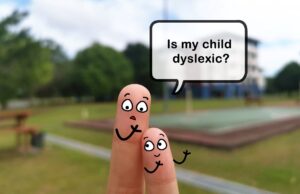
Dyslexia Diagnosis
As a parent, if you suspect that your child may have dyslexia, you need to meet with a qualified professional to get a formsl dyslexia diagnosis and discuss the next steps. If you are a teacher, you can discuss the child’s difficulties with the school counsellor and the parents. Often, if a child shows significant signs of having dyslexia, schedule a formal dyslexia diagnosis for them. Other factors like vision or hearing impairment, delay in development, or language-processing disorders can influence a child’s language difficulties.
Dyslexia Diagnosis – The Process
All the above factors are investigated in a formal dyslexia diagnosis starting with a parent’s observations, family history, and the child’s developmental history both in house and school. The professional will need information on the child’s symptoms and the age when you first noticed the signs. They will want to know about the child’s performance in school; hence, it helps to obtain information on development in reading, counting, spelling, and other school subjects from teachers. The professional establishes the writing skills with the help of writing samples of the child’s (e.g. stories, freewriting, dictation), possibly from several different school years.
The professional might want to observe your child in their learning environment, and they will also ask your child to take part in a series of tests. These tests examine your child’s reading, writing and language abilities. They may administer tests for logical reasoning and memory too. They might also test your child’s speed to process visual and auditory (sound) information along with their organisational skills.

After completing the assessment, you will receive a formal report outlining whether your child has received a dyslexia diagnosis or not. It will also outline your child’s strengths and weaknesses.
The professional will also provide you with recommendations for improving areas in which your child is facing difficulties. For example, finding out what lies behind your child’s reading difficulties and challenges can help find a better treatment to help your child progress and secure their future.